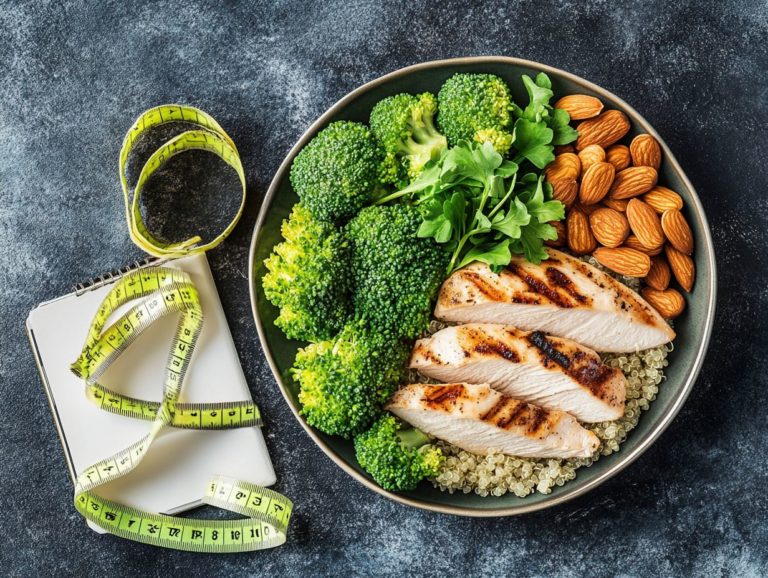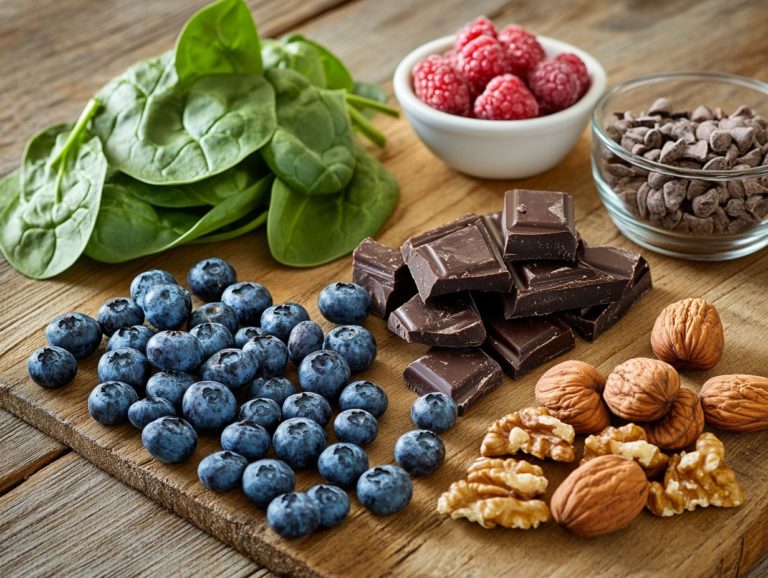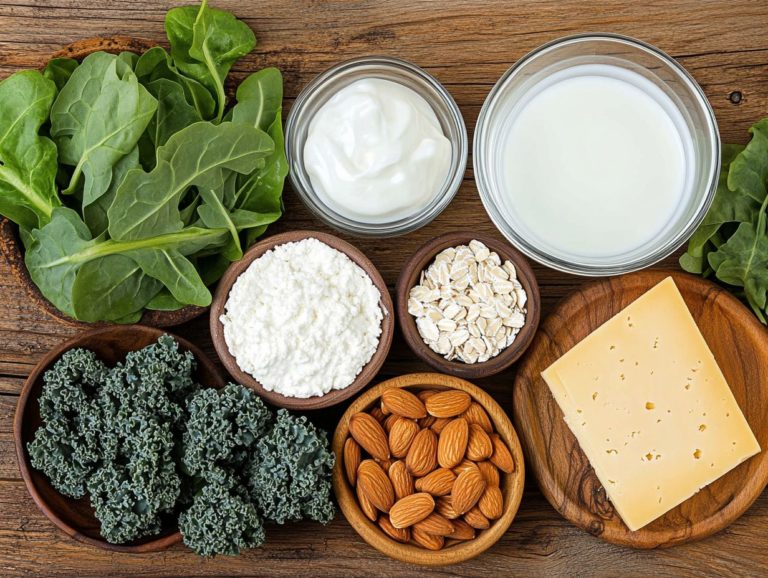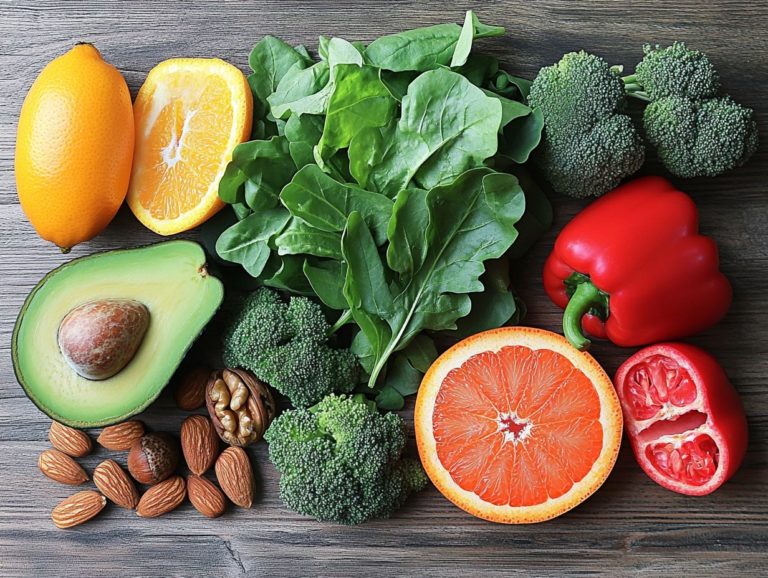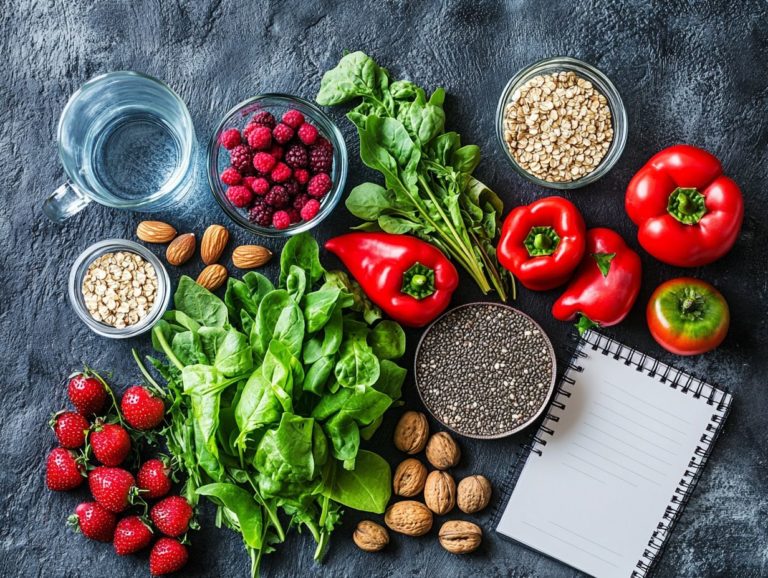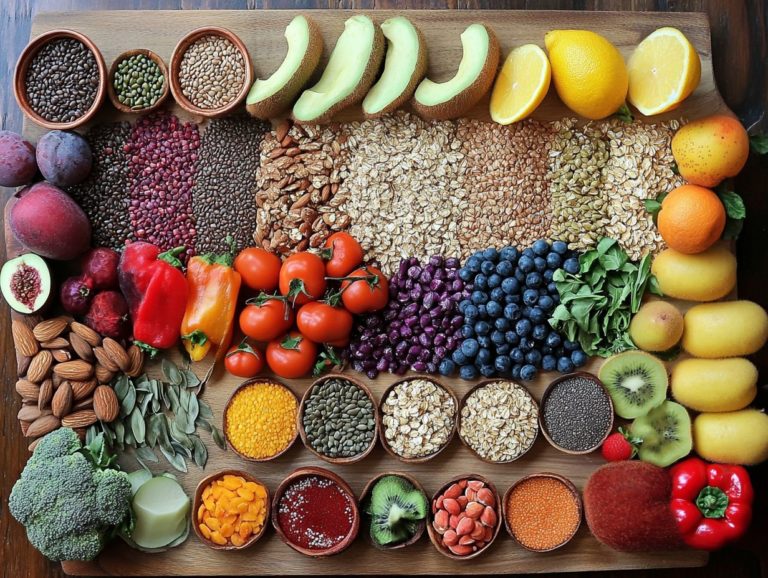The Importance of Food Sources for Hydration
Staying properly hydrated is vital for your overall health, yet it’s easy to overlook how much food contributes to your hydration. While drinking water is important, certain foods can significantly enhance your fluid intake and boost your well-being.
This article explores the importance of hydrating foods, showcasing fruits and vegetables that are high in water content, along with other nourishing options. You ll discover meal ideas, refreshing drink recommendations, and practical tips designed to keep you hydrated throughout the day.
Want to stay refreshed all day? Here are the top hydrating foods you should try!
Contents
- Key Takeaways:
- Understanding Hydration and Food Sources
- Top Hydrating Foods to Incorporate into Your Diet
- Incorporating Hydrating Foods in Your Daily Meals
- Hydrating Drinks to Add to Your Diet
- Top Tips for Daily Hydration
- Frequently Asked Questions
- What is the importance of food sources for hydration?
- How do food sources contribute to our daily hydration needs?
- What are the best food sources for hydration?
- Why is it important to consume food sources for hydration during physical activity?
- Do certain food sources provide better hydration than others?
- Are there any food sources we should avoid for hydration?
Key Takeaways:
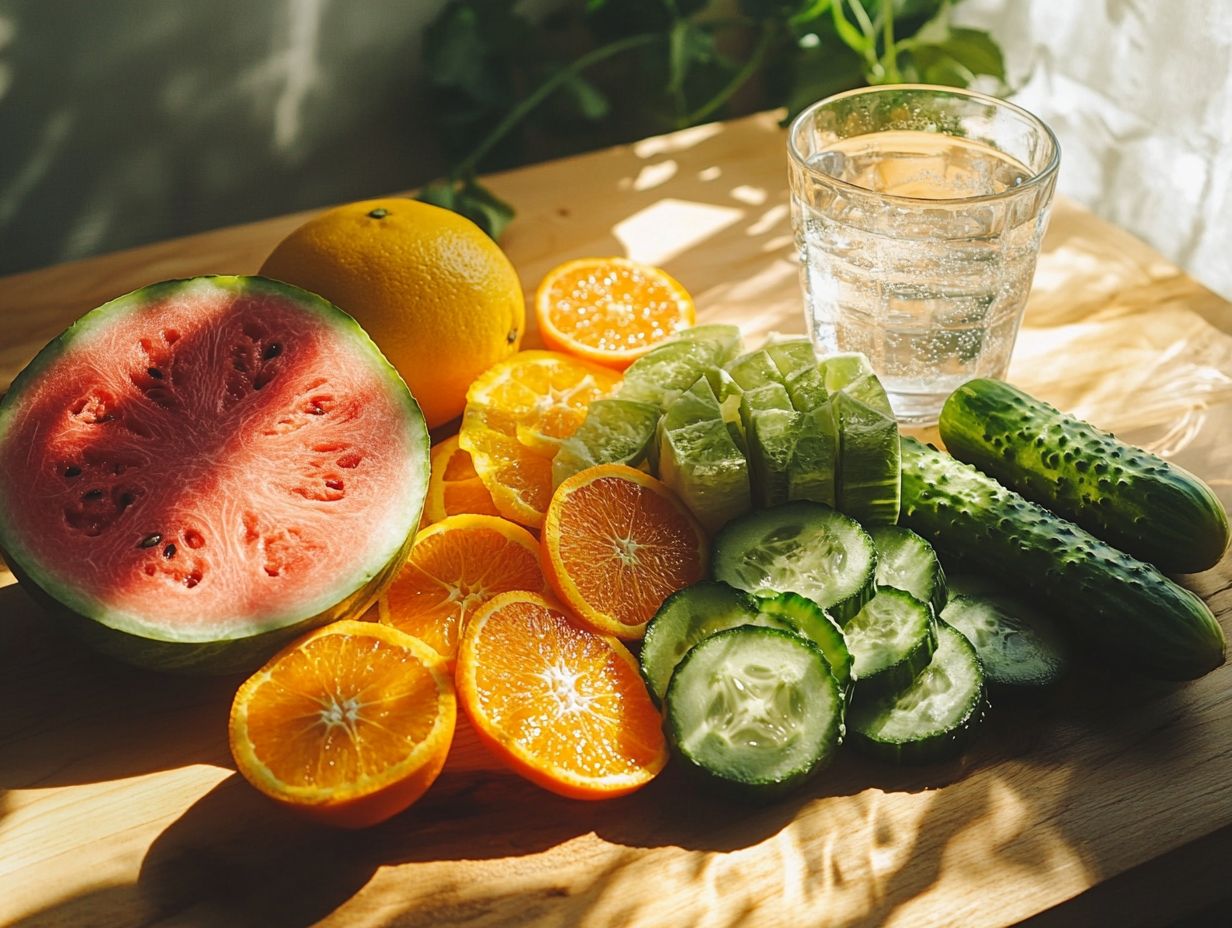
Food sources play a vital role in hydration, providing not just water but also essential electrolytes and nutrients for our bodies. Fruits and vegetables with high water content, such as watermelon and cucumbers, are excellent choices for staying hydrated. It’s important to recognize the importance of hydration and electrolytes and to include hydrating drinks like coconut water and herbal tea in your diet. Carrying a water bottle can also help maintain hydration levels.
Understanding Hydration and Food Sources
Understanding how food affects hydration is key for achieving optimal health. Hydration is essential for many body functions, like metabolism and temperature control. The foods you consume can greatly influence your daily fluid intake.
Foods rich in water, such as fruits and vegetables, not only provide hydration but also deliver essential nutrients that enhance health, support physical activity, and help prevent dehydration.
Your dietary choices can significantly affect your hydration levels and overall health.
Why Food Sources are Important for Hydration
Food sources play a crucial role in your hydration journey. For instance, incorporating the top 10 food sources for optimal hydration can provide essential nutrients and water content that help maintain optimal body weight and prevent dehydration.
Incorporate hydrating foods like cucumbers, watermelon, and spinach into your meals. Not only do they increase your fluid intake, but they also provide a wealth of vitamins and minerals vital for your overall health.
Cucumbers, with about 95% water content, make for a refreshing snack. Watermelon is rich in fiber and electrolytes, quenching your thirst and replenishing lost fluids during hot summer days.
Spinach, high in water and essential nutrients like iron and calcium, is a fantastic addition to salads or smoothies, supporting your hydration while delivering significant health benefits.
Easily add these tasty hydrating foods to your meals, and feel the difference!
Top Hydrating Foods to Incorporate into Your Diet
Incorporating hydrating foods into your diet can greatly enhance your fluid intake and support essential bodily functions. These foods not only hydrate you but also provide an abundance of essential nutrients vital for your overall well-being.
Think of fruits and vegetables with high water content cucumbers, watermelon, and romaine lettuce. They deliver hydration while supplying important vitamins and minerals that enhance your daily health.
By prioritizing these foods, you can effectively cater to your hydration needs throughout the day.
Start your hydration journey today by incorporating these foods into your meals!
Fruits and Vegetables with High Water Content
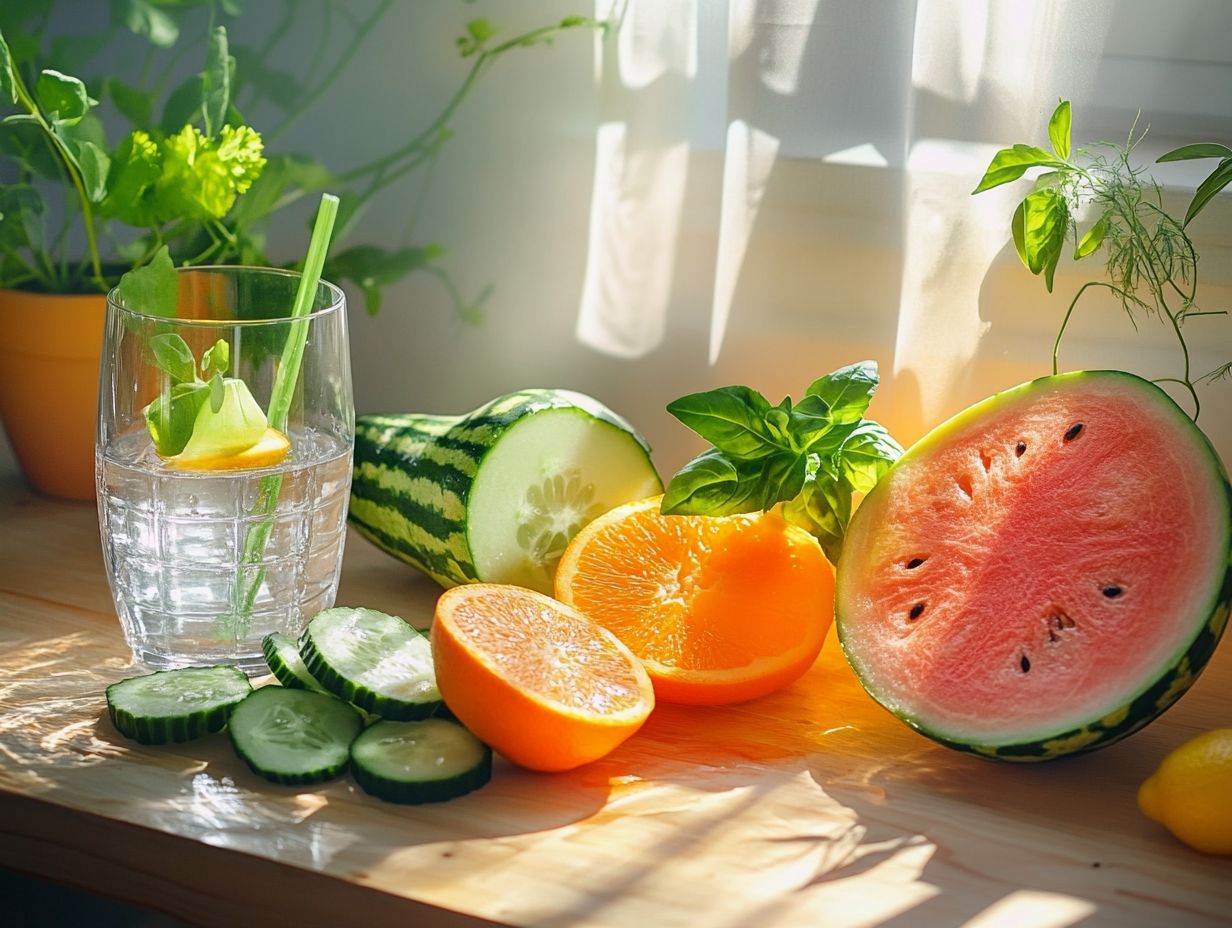
Several fruits and vegetables are packed with high water content, making them exceptional choices for hydration and important vitamins and minerals. Watermelon, cucumber, and strawberries truly stand out. Incorporating these hydrating gems into your daily meals can significantly elevate your wellness.
Take watermelon, for instance. With over 90% water, it not only satisfies your thirst but also delivers essential vitamins A and C. It’s perfect for those refreshing summer salads or as a sweet, guilt-free dessert.
Cucumbers boast around 95% water content. They make an ideal crunchy snack on their own or can be sliced into sandwiches to add a delightful crunch and moisture.
Let s not forget strawberries, which provide a burst of flavor while being rich in antioxidants. Toss them into your morning smoothie, sprinkle them over yogurt, or simply enjoy them fresh for a nourishing snack that supports hydration and overall health.
Other Foods to Boost Hydration
Don t miss out on foods like iceberg lettuce, bell peppers, and mushrooms to elevate your hydration game and reap the many health benefits.
These hydrating options are easy to incorporate into your daily meals, ensuring hydration is at the forefront of your wellness routine. Iceberg lettuce is about 95% water, making it an exceptional choice for keeping your fluid levels in check.
Bell peppers, bursting with vitamin C, offer a satisfying crunch along with generous moisture content, enhancing both flavor and hydration of your dishes. Let s also highlight mushrooms; their high water content positions them as excellent meat substitutes in various recipes, delivering rich umami flavors.
To make the most of these benefits, why not whip up a vibrant salad featuring these ingredients, drizzled with a light vinaigrette? Or toss them into stir-fries for a delicious boost of hydration that will keep you feeling refreshed throughout the day.
Incorporating Hydrating Foods in Your Daily Meals
Incorporating hydrating foods into your meals can elevate your hydration levels, enhance your well-being, and transform meal times into a delightful experience.
By thoughtfully weaving these foods into your diet, you ensure that you’re meeting your fluid intake needs while gaining essential vitamins and minerals. Health guidelines recommend including a colorful array of hydrating fruits and vegetables think spinach, strawberries, and cucumbers to bolster hydration and digestive health, especially during warm weather or physical activity.
Here are some strategies to seamlessly make these foods the star of your meals.
Meal Ideas and Recipes
Creating meal ideas that showcase hydrating foods can be effortless and delightful. Consider these options:
- Refreshing cucumber and tomato salad
- Chilled gazpacho with blended tomatoes and peppers
This vibrant cucumber and tomato salad not only quenches your thirst but also delivers a wealth of vitamins and minerals crucial for your overall well-being. The crispness of cucumbers, combined with the juiciness of ripe tomatoes, offers a delightful texture, while the subtle sweetness of summer squash beautifully complements the earthiness of spinach.
Experimenting with various preparation methods, such as marinating the vegetables in a zesty lemon vinaigrette, can elevate the flavors dramatically. A chilled gazpacho crafted from blended tomatoes, peppers, and herbs provides a satisfying soup option, maintaining your hydration levels while delivering a refreshing twist on classic flavors that nourish your body.
Hydrating Drinks to Add to Your Diet
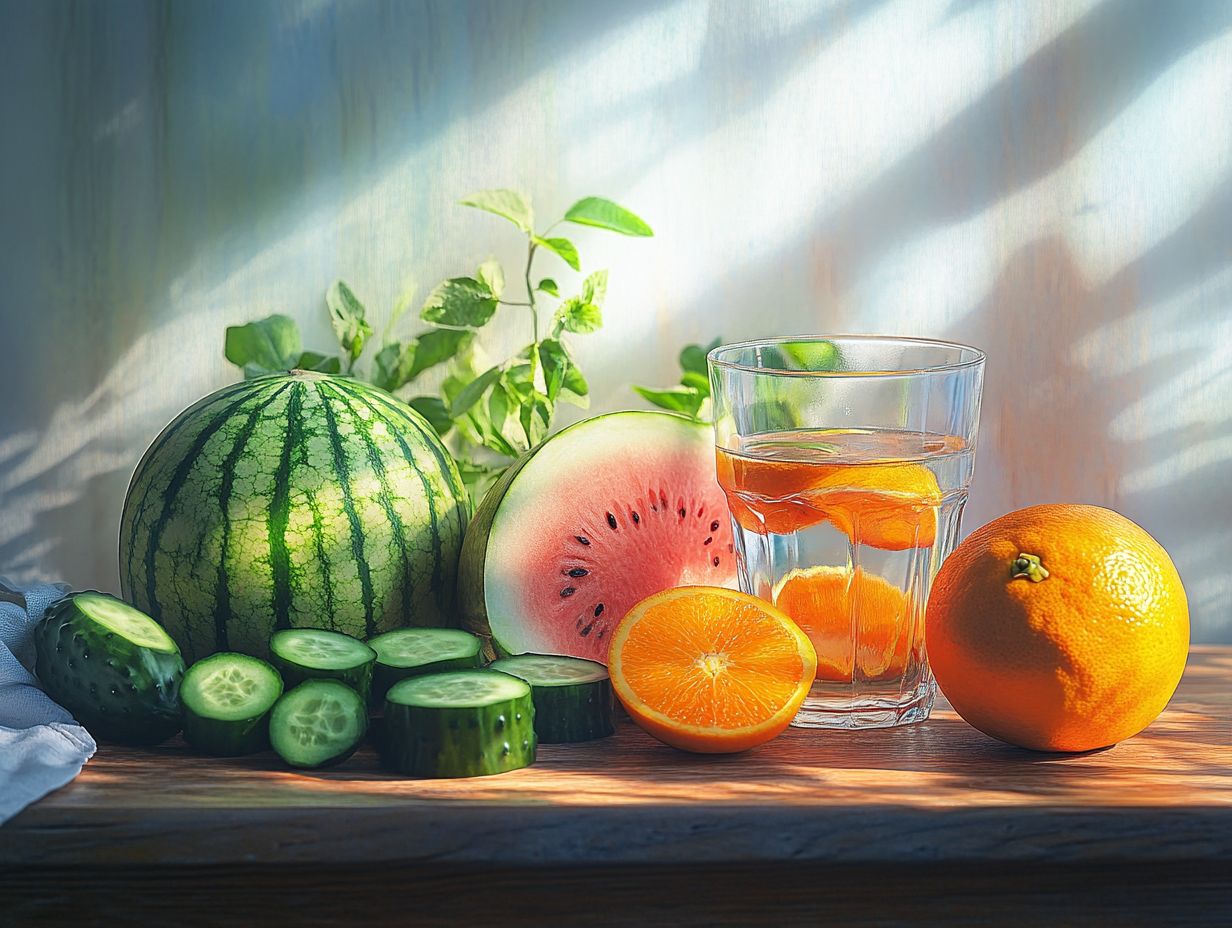
Adding hydrating drinks to your diet is a smart move. It boosts your overall fluid intake and supports various bodily functions.
The health benefits of staying adequately hydrated are clear. Staying hydrated can help maintain your metabolism, support kidney health, and enhance mental wellness.
Sports drinks and caffeinated beverages can help with hydration but should be consumed mindfully to avoid excess sugars and stimulants. Selecting the right drinks significantly influences your hydration levels, especially during physical activities or in hot weather.
Make those choices count for your health and well-being.
Best Beverages for Hydration
The finest beverages for hydration start with water. However, delightful options like coconut water, herbal teas, and electrolyte-infused drinks add a refreshing twist to your routine.
These choices not only satisfy your thirst but also come with added benefits. For instance, coconut water is rich in potassium and effectively replenishes lost electrolytes after a workout. Herbal teas offer a captivating array of flavors, whether enjoyed hot or cold, while delivering a healthy dose of antioxidants to your diet.
However, keep an eye on the sugar content in flavored or sweetened beverages. Excess sugar can undermine the very benefits you’re seeking from hydration. By choosing unsweetened versions or low-sugar brands, you can stay hydrated without unnecessary calories.
This makes plain water, unsweetened herbal teas, and coconut water the top picks for anyone pursuing a wellness-focused lifestyle.
Top Tips for Daily Hydration
Staying hydrated throughout the day is entirely achievable with a few practical strategies tailored to your lifestyle. Consistency is essential for maintaining adequate fluid intake.
Consider incorporating habits such as:
- Carrying a reusable water bottle
- Enjoying hydrating foods
- Setting gentle reminders
These habits can boost your hydration levels significantly. It’s crucial to acknowledge your individual fluid needs, which can fluctuate based on activity levels, temperature, and body weight.
By prioritizing hydration, you pave the way for enhanced energy levels, improved concentration, and an overall sense of well-being.
Practical Strategies for Maintaining Hydration Levels
Practical strategies for maintaining your hydration levels include setting daily intake goals, using reminders, and keeping hydrating foods within easy reach. These approaches help you maintain a consistent focus on fluid consumption.
Incorporating technology can significantly enhance these strategies. For example, smartphone apps can track your fluid intake and send you timely notifications to remind you to drink throughout the day.
Meal planning is equally essential. By preparing dishes with water-rich ingredients like cucumbers, oranges, and soups, you can effortlessly boost your hydration levels.
Developing a keen awareness of your body’s cues like thirst or fatigue can signal when it’s time to hydrate.
By weaving these methods into your daily routine, such as setting a timer to drink water during work breaks, you can effortlessly cultivate a sustainable habit that prioritizes your wellness and hydration.
Frequently Asked Questions
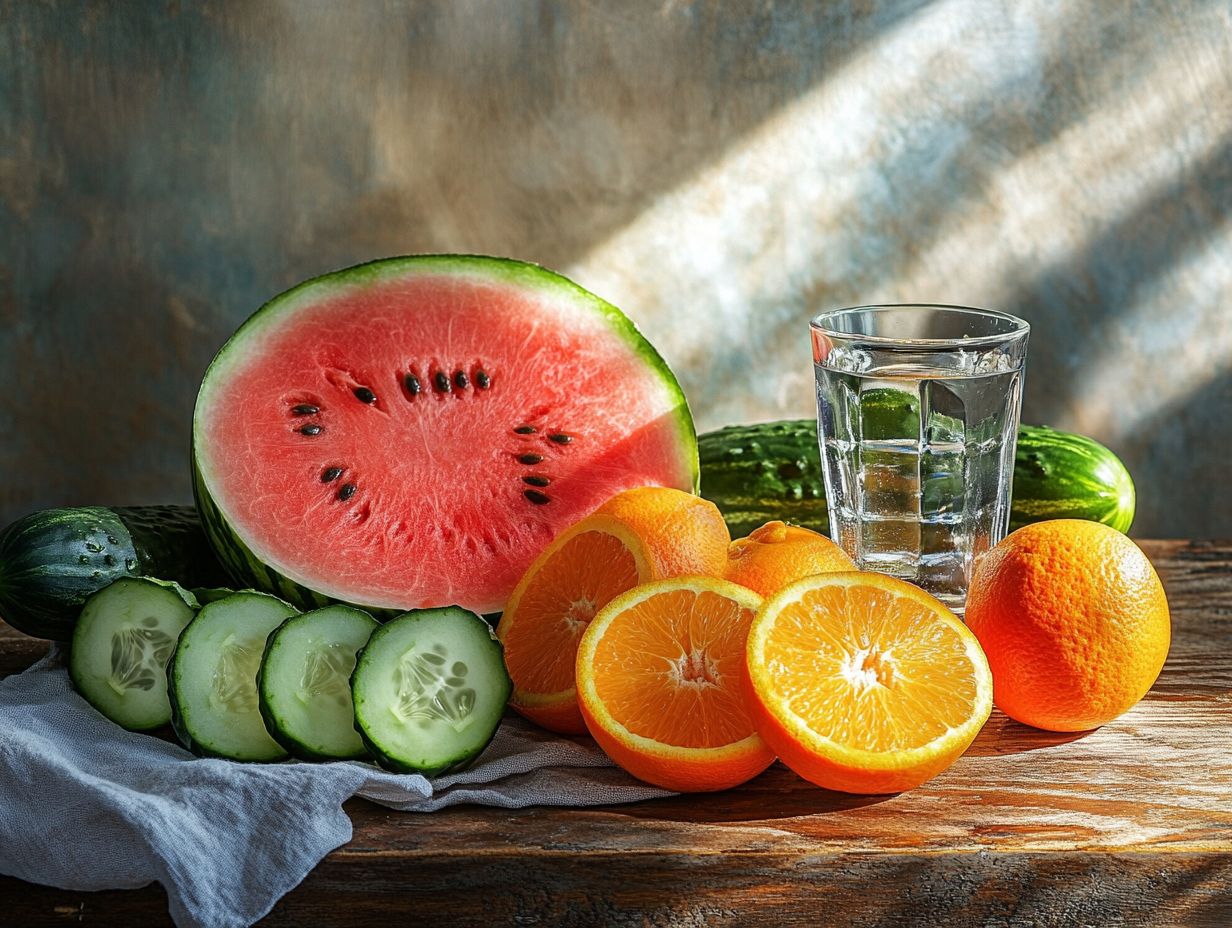
What is the importance of food sources for hydration?
Food sources give us fluids and nutrients we need to stay hydrated, highlighting the importance of hydration in dietary guidelines. They play a crucial role in keeping our bodies hydrated.
How do food sources contribute to our daily hydration needs?
Around 20% of our daily fluid intake comes from solid food sources. Fruits, vegetables, and soups are high in water, helping us stay hydrated throughout the day.
What are the best food sources for hydration?
Some of the best food sources for hydration are water-rich fruits like watermelon, grapes, and oranges; vegetables like cucumbers, lettuce, and tomatoes; and soups made with broth or stock. Understanding the importance of food sources for weight management is also key to maintaining overall health.
Why is it important to consume food sources for hydration during physical activity?
When we exercise, we sweat a lot and lose fluids. Eating hydrating foods helps restore these fluids and keeps us from getting dehydrated!
Do certain food sources provide better hydration than others?
Yes! Some foods hydrate better than others. For instance, fruits and vegetables like watermelon, cucumber, and lettuce are excellent sources of hydration compared to snacks like crackers or chips.
Are there any food sources we should avoid for hydration?
Most foods can help us hydrate, but it s smart to limit those high in sugar, salt, or caffeine. These can actually make us more dehydrated!

